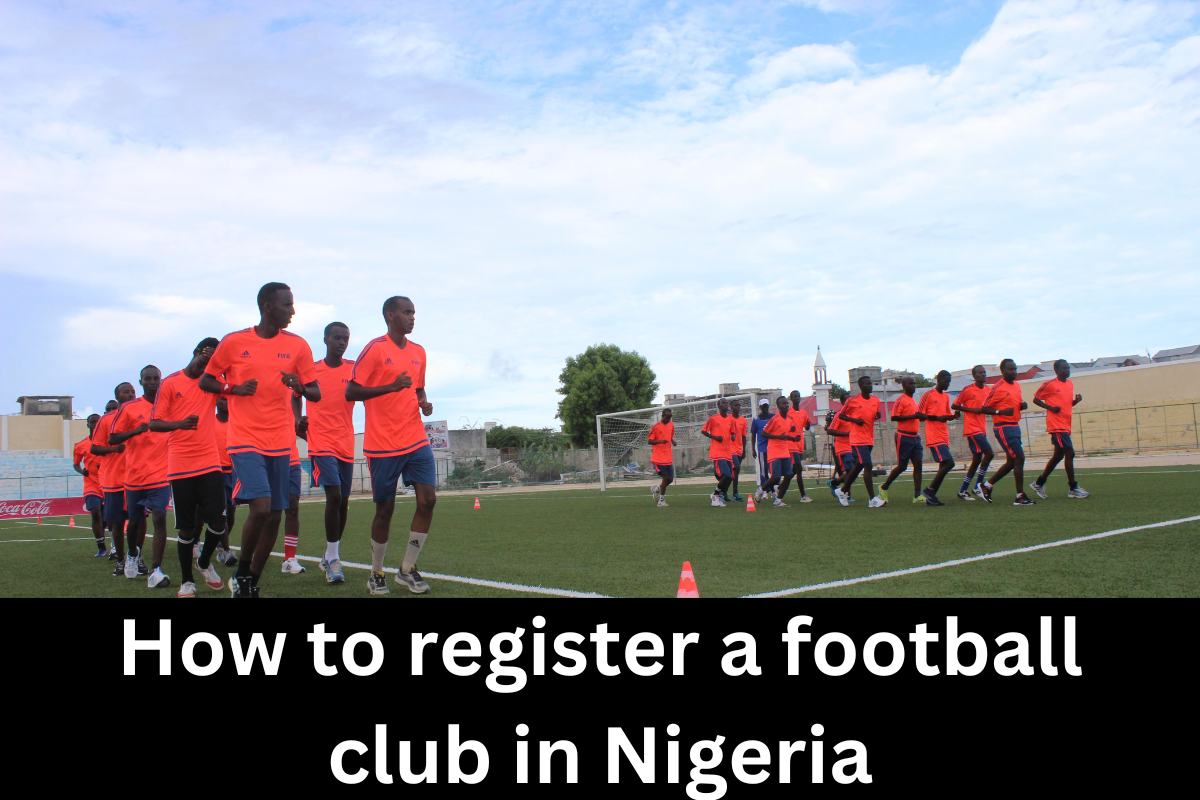Chances are that nine out of ten Nigerians you meet in any city in the country love football. This much-cherished sport, today — despite its administrative shortages on a national level — still serves as a dream factory to thousands, perhaps millions, of young people across the country. Yet, as much as passion fuels the sport, a venture such as establishing a football club in Nigeria takes more than just being a fan. Passion, though a core element, is merely the starting point.
Converting that love for the sport into an innovation as concrete and comprehensive as a licensed football club is a whole new ball game, which — and this goes without saying — requires structure, paperwork, regulatory compliance, and commitment to long-term development.
If you’re seeking to establish a grassroots team or eventually compete in the Nigerian Professional Football League (NPFL), look no further. This guide covers every step of the Nigerian football club registration procedure: from obtaining your club’s legal identity to affiliating with football authorities and establishing your squad for competition.
So, let’s get into it.
Step 1: Register your club name with the Corporate Affairs Commission (CAC)
First and foremost, a football club in Nigeria must become a legal entity. This entails registration with the Corporate Affairs Commission (CAC), which is tasked with regulating and documenting corporate bodies in the country. Without this obligatory enrollment, no club is recognised by formal football associations or allowed to participate in authorised competitions.
How to register a football club in Nigeria through the CAC:
- Choose a unique club name
Begin by choosing a distinct title for your football club. It should not resemble or clash with any other registered entity. Visit the CAC web portal to check for name availability.
- Decide on a legal structure
There are three major options for football club registration in Nigeria under the CAC:
- Business Name: Easy and reasonably priced, ideal for grassroots or semi-professional teams.
- Limited Liability Company (LLC): Provides a stronger framework for clubs looking to operate commercially or expand.
- Incorporated Trustees (NGO): Suitable for community-based or youth development clubs with non-profit goals.
- Prepare and submit the required documents
The documentation varies depending on the structure you opt for, but generally it includes:
- Completed CAC registration form
- Valid means of identification for directors or trustees
- Passport photographs
- Memorandum and Articles of Association (for companies)
- Constitution (for NGOs)
- Proof of address for business operations
- Pay the required fees
CAC fees vary according to your structure of choice. Business names are less costly, but limited businesses and NGOs incur higher rates. Ensure you use authorised CAC channels to make your payments.
- Obtain your CAC Certificate of Incorporation
Once your application has been evaluated and accepted, you will receive a certificate attesting to your club’s legal standing in Nigeria. This certificate is essential for all subsequent phases, including affiliation with your state football association and the Nigeria Football Federation.
- Open a dedicated business bank account
After securing a CAC certificate, you must proceed to register a business bank account in the club’s name. This is key because grant entities, sponsors, and state FAs will need formal banking information for disbursements. A club-specific account makes bookkeeping easier and conveys credibility to potential investors.
Step 2: Get affiliated with your state football association (FA)
Once the first phase with the CAC has been completed, the following step is to affiliate with the state football association (FA) where your club will operate. The Nigeria Football Federation (NFF) oversees each state’s FA, and membership is required to receive official recognition, participate in regional competitions, and be included in the larger football milieu.
This registration phase defines a club’s entry into organised football under the NFF’s radar. Without state FA affiliation, the possibility of participation, progression into NFF-level tournaments, or access to development opportunities is zero.
How to get affiliated with your state FA:
- Locate and contact the state FA office
Locate the state’s FA office (e.g., Rivers State FA, Kano State FA, or Lagos State FA). Most operate from the sports council or the state stadium.
- Apply for affiliation
A club affiliation form — to contain your club’s essential details, goals, and operational base — will be made available to you by the FA.
- Prepare and submit the required documents
You need to tender the following for review:
- CAC Certificate of Incorporation
- Club Constitution or Statement of Purpose
- Proof of operational address (rental agreement or utility bill)
- Passport photographs of officials and players
- Preliminary list of players and technical staff
- Club logo and colour description (if applicable)
- Pay the applicable affiliation fees
Fees vary from state to state and are defined by a club’s status: grassroots, semi-professional, or youth-based. Verify the current rates and ask for an official receipt.
- Await confirmation and certification
After all documentation has been approved and payment is received, the state FA will issue an affiliation certificate or official letter accrediting your club. If you meet the registration deadlines, you may be included in the fixture schedule for that year.
Step 3: Fulfil Nigeria Football Federation (NFF) requirements
This registration phase involves compliance with the national governing body of football, the Nigeria Football Federation (NFF), which administers all footballing operations at all levels: from grassroots to national leagues and international representation. A club seeking to compete beyond regular local matches or advance further must mandatorily meet NFF standards. A successful registration with this agency is a marker of distinction that furthers a club’s odds of attracting partnerships or players.
Understanding the framework of Nigerian football is important here. The NFF oversees registration and regulation at three levels:
- Amateur Clubs: Community teams or grassroots categories.
- Semi-Professional Clubs: Competitive, but not quite professionalised
- Professional clubs: Licensed and regulated by the League Management Company (LMC) at top-tier contests such as the Nigeria Professional Football League (NPFL).
Women’s football clubs and the NWFL
When registering a women’s team, you’ll affiliate through the Nigeria Women’s Football League (NWFL), the female equivalent of the men’s league structure. The NWFL Secretariat publishes the deadlines and required fees, but the application procedure follows the NFF requirements (club constitution, technical staff credentials, medical cover, and home-ground approval). Endeavour to review the current season’s circular and submit your paperwork promptly.
Key requirements from the NFF and League Management Company (LMC)
- Comply with registration timelines
The NFF follows a registration calendar for each season. Clubs that fail to register within the allotted window are subject to sanctions or exclusion.
- Submit standard documentation
Your club will be required to supply the following, depending on your operational level:
- CAC Certificate of Incorporation
- Proof of state FA affiliation
- Club Constitution and Governance Structure
- Credentials of technical and coaching staff
- Medical support documentation (e.g., partnership with a clinic or a certified first-aid responder)
- Facility agreements or proof of home ground access
Clubs pursuing youth-focused operations (U13, U15, and U17) must submit an Academy/Development Annexe and NFF forms. The attached document contains a list of all age-grade teams, grassroots coaching certifications, and safety measures. In addition to protecting players under the NFF’s Child Protection Framework, registering these teams ensures eligibility for national youth tournaments.
- Register with the League Management Company (LMC) (if applying for professional league status). Clubs at the professional level are required to meet additional compliance benchmarks via the LMC, such as:
- Financial records or sponsor agreements
- Minimum facility standards
- Staff contracts and insurance coverage
- Participation in club licensing workshops and inspections
- Maintain an updated digital profile (increasingly required)
Clubs with growth plans are required to have an active online presence to promote fan engagement, transparency, and fixture announcements. In fact, state FAs now mandate having a functioning website and at least one verified social media account. A dormant page may damage sponsorship talks or cause delays in licence renewal.
Step 4: Register your players and staff
The next crucial step, official registration of players and technical staff, comes after your club has been recognised by both the CAC and the relevant authorities. This is an essential aspect of the football club registration process in Nigeria; failure to properly register your entire personnel could lead to match disqualifications, fines, or suspension from official tournaments.
How to register players and staff:
- Compile a list of players and staff
Prepare a complete list that includes:
- Full names
- Dates of birth
- Playing positions (for players)
- Roles (for technical staff, e.g., coach, assistant, physiotherapist)
- Submit the required identification documents
For every single player and staff member, present the following:
- Two recent passport photographs
- Valid means of identification (e.g., national ID, birth certificate, or international passport)
- Completed registration forms (provided by your state FA)
- Sign standard player contracts
The NFF and most state FAs expect that teams utilise standardised contract templates for coaching personnel and players. These contracts include release clauses, a code of conduct, terms of engagement, and payment (where applicable).
- Provide medical clearance
All players must undergo a basic medical examination prior to registration. A certified physician must sign and submit the medical clearance to the FA. This is crucial for player safety and often non-negotiable.
- Issue club IDs or passes
After registration approval, players and staff will receive official identification cards or passes from the state FA. They must be presented during games or FA-approved events.
Step 5: Secure a home ground
A football club in Nigeria, at grassroots, semi-professional or national league levels, must possess a designated home ground. This is a fundamental requirement under both the state and NFF. The home ground is your club’s official base, and its suitability will be evaluated as part of the affiliation and licensing procedure.
What counts as a home ground?
A home ground may include:
- A government or privately owned stadium
- A community football field that meets basic standards
- A school, university, or sports facility used through a rental or partnership agreement
Steps to secure a home ground:
- Identify a suitable facility
The ground should be accessible, secure, and spacious enough to accommodate spectators. For league purposes, it must fit FIFA pitch dimensions (about 100-110m long and 64-75m wide).
- Get approval or consent
If your club has no field of its own, you will need to obtain formal permission, which typically takes the form of:
- A Letter of Consent from the Facility Owner
- A lease agreement or Memorandum of understanding (MOU) for long-term arrangements
- Document the agreement
The state FA or NFF will request a copy of your Letter of Consent or rental agreement. Some FAs may undertake physical inspections to validate claims.
- Ensure basic facilities are in place
Especially for competitive or semi-pro clubs, your facility should offer:
- A clear, well-marked pitch
- Dressing rooms or changing areas
- Functional toilets
- Spectator safety measures (e.g., fencing or barriers)
Step 6: Comply with insurance and medical requirements
In today’s modern football environment, player safety and medical readiness are two fundamental factors; they are non-negotiable: your club must meet basic medical and insurance protocols. Regulations are enforced by both the state FA and the NFF to guarantee that all registered clubs act ethically and can respond adequately to emergencies.
Minimum health and safety requirements for football clubs in Nigeria:
- Basic health insurance or a clinic partnership
A registered club must have some form of medical coverage for its players. This could be:
- A group health insurance plan
- A written agreement or referral partnership with a local clinic or hospital
- Access to a certified medical practitioner who can respond to injuries
- Medical clearance for players
Before registering, each player must undergo a medical exam. This is done to verify their physical fitness.
- Matchday medical preparedness
On matchdays, clubs must ensure:
- Availability of a first-aid kit
- A designated medical officer or first responder on standby
- Ambulance support for home matches (especially in higher leagues or semi-professional tiers)
- Documented compliance
Depending on your level of operation, you will need to show proof of compliance — such as clinic MOUs, insurance agreements, or clearance documents — to the state FA or NFF. This might be a recurrent obligation during periodic renewals or inspections.
Step 7: Provide a financial performance guarantee
This is another crucial process, particularly for clubs aspiring to join Nigeria’s professional leagues; a financial performance guide is mandatory. It is a safety protocol that ensures each team meets its financial obligations during the season regarding travel, matchday operations, player pay, and other logistics. Clubs are enjoined to begin financial planning and sponsor outreach months before registration to avoid last-minute difficulties in securing this guarantee.
What is required?
- A financial performance guarantee issued by a licensed and regulated financial institution in Nigeria.
- The institution must agree to honour this guarantee should the team default on its financial responsibilities pertaining to the league.
Why it’s important:
- It demonstrates your club’s fiscal solvency and operational readiness.
- It increases confidence among league organisers, sponsors, and other clubs.
- It safeguards the league’s credibility by ensuring that all fixtures are honoured.
- It could prove as the decisive factor between the approval or refusal of a professional licence.
Step 8: Understand tax considerations and compliance
Football clubs in Nigeria may begin as passion projects, but once properly established with the Corporate Affairs Commission (CAC), they are recognised as legal establishments and subject to tax responsibilities. Once the club is operational, you should consult with a tax advisor.
Key considerations
- Tax Identification Number (TIN): A TIN is mandatory for setting up a business bank account, soliciting grants, and submitting a yearly statutory document.
- Annual returns: Clubs registered as companies must file annual returns with the CAC and the FIRS, even if no profit was made. Failure to file may result in sanctions or delisting.
- Pay-As-You-Earn (PAYE): A club must pay remuneration to its players, coaches, and administrative personnel; as such, it must deduct and submit PAYE taxes on each wage.
- VAT and sponsorship deals: When a club begins to generate revenue from ticketing, goods, or sponsorships, Value Added Tax and corporate income tax may apply.
Final tips before you kick off
At this phase, your club is on the verge of becoming fully registered as a footballing body in Nigeria, save a few last steps and helpful reminders to consolidate readiness and reputation.
Important reminders for new football clubs:
- Follow your state FA’s calendar
Each state FA publishes a seasonal calendar with important dates for registration, match schedules, renewals, workshops, and disciplinary proceedings. This calendar helps track operations and ensures that key timelines or deadlines are met.
- Study FIFA, CAF, and NFF regulations
Documents produced by FIFA, the Confederation of African Football, and the Nigeria Football Federation describe regulations governing player eligibility, age categories, club licensing, and conduct. Compliance with these rules eliminates administrative errors and sanctions.
- Keep accurate records
Maintain organised documentation, including player contracts, medical records, and receipts. This is particularly vital for annual renewals, audits, and league evaluations.
Conclusion
It may appear taxing, but registering a football club in Nigeria is entirely plausible with the appropriate information and a step-by-step approach. This process, beyond paperwork, establishes the legitimacy of your club and positions it for long-term development. Converting that rudimentary passion for football into a structured reality requires, firstly, the registration of your club name and building from there.







